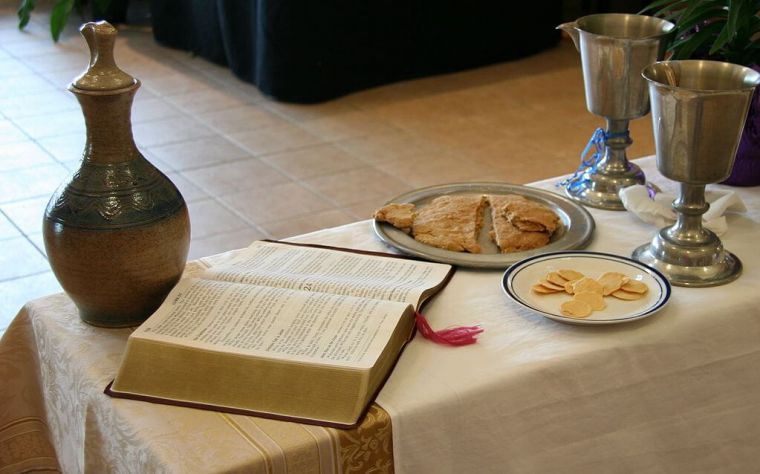How did we ever make Holy Communion so complicated?

WE can't even agree what it's called, can we? Is it 'Holy Communion', the 'Eucharist', 'The Lord's Supper', 'Mass' or even, simply, 'Breaking of Bread'?
Sometimes when as a church leader I contemplate everything connected with this thing we call 'church' I ask myself: 'Did Jesus ever really intend all this to be as complex as we often seem to make it?' I am 99.9 per cent sure the answer to that question is 'no'!
Communion is a case in point. (At least, that's what I am used to calling it – but if you use one of the other names instead, please keep on reading!). As we continue our fortnightly pilgrimage through Mark's gospel, we come now to the section where Jesus is eating with his friends at what has become known as the Last Supper.
And this is how things very simply unfold: 'While they were eating, he took a loaf of bread, and after blessing it, he broke it, gave it to them, and said, "Take; this is my body." Then he took a cup, and after giving thanks he gave it to them, and all of them drank from it. He said to them, "This is my blood of the covenant, which is poured out for many. Truly I tell you, I will never again drink of the fruit of the vine until that day when I drink it new in the kingdom of God.' (Mark 10v22-25).
Let's just pause for a moment and consider what Jesus did not say. He did not say, for example: 'And by the way, when you do this in remembrance of me, please ensure that you use the following items of linen and silverware: a burse, a chalice veil, a pall, a paten, a purificator, chalice and corporal – and let me just pause to sketch out a diagram here to make sure you get it right. Please also ensure you have at least two lighted candles nearby.'
Nor did he say: 'By the way, chaps, I am sure it goes without saying – you need a special table which should be called an altar on which to place all this stuff. And – nearly forgot this one – keep up with your note-taking Peter – make sure that as the months of the year go by, you change the colour of the vestments and also the hangings regularly: violet, white, green, red, gold, black, rose and so on. Got it?'
Jesus did not say: 'My friends, please be clear that when sharing bread and wine in the future, this ceremony should be presided over by someone who has received three years of theological training, ideally in a city far away from where they live. They should then have a kind of apprenticeship for a year before being licensed at a service in a cathedral to say something similar – albeit much, much longer – to the words I have just now shared with you.'
He did not then go on to say: 'Please notice what I am wearing as I share this meal with you – namely an alb, cincture, chasuble, dalmatic, cassock, surplice and stole, plus clerical collar of course! – and make sure you are dressed likewise.' I am sorry if this upsets you, but in truth, my friend, let us be clear: these are things Jesus did not say!
Are you offended? Please forgive me. But let me ask – if these things are important to you, then where do you find them in the teaching of Jesus? Where indeed do you see them in the rest of the New Testament?
I am not – let us be absolutely clear – seeking to make light in any way of Holy Communion itself. Indeed, one thing the New Testament makes clear is that anyone 'who eats the bread or drinks the cup of the Lord in an unworthy manner will be answerable for the body and blood of the Lord' (1 Corinthians 11). We are to 'examine ourselves' before we eat, as that chapter goes on (11v28) 'for all who eat and drink without discerning the body eat and drink judgement against themselves'. No, this is mighty serious stuff and we dare not take it lightly.
Moreover, we do not want to disregard 2,000 years of church history, and the wisdom of those who have gone before us. So we will think more about some of these things in future articles in this series, and ask ourselves what Communion means – and what really is necessary, desirable or discardable when it comes to sharing it together.
But for now let us pause and ask: is it just possible that our Communion services (or whatever we call them) have become so cluttered – by rules and traditions Jesus never instituted, and by routines that have grown over-familiar and stale – that we have lost sight of the cross? As we think about these things may the words of Isaac Watts in his famous hymn come afresh to us: 'When I survey the wondrous cross, On which the Prince of glory died, My richest gain I count but loss, And pour contempt on all my pride.'
David Baker is a former daily newspaper journalist now working as an Anglican minister in Sussex, England. Find him on Twitter @Baker_David_A











